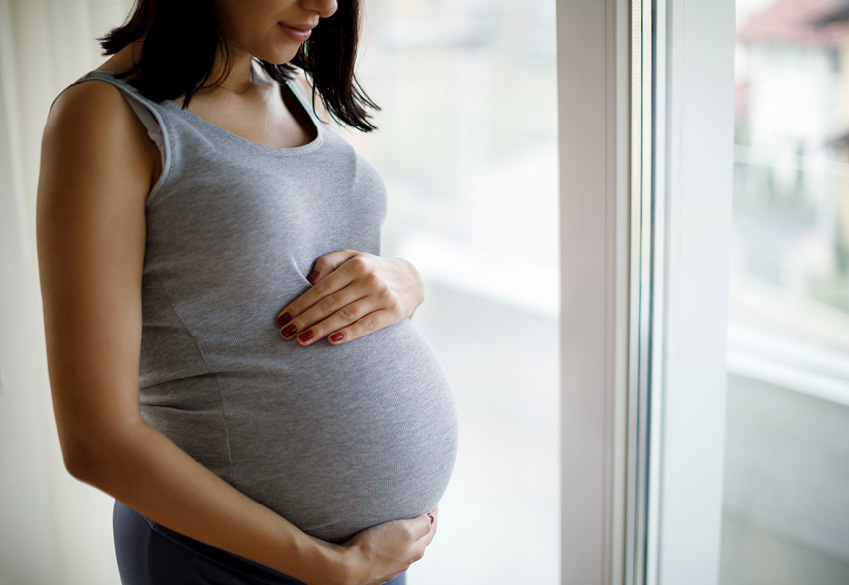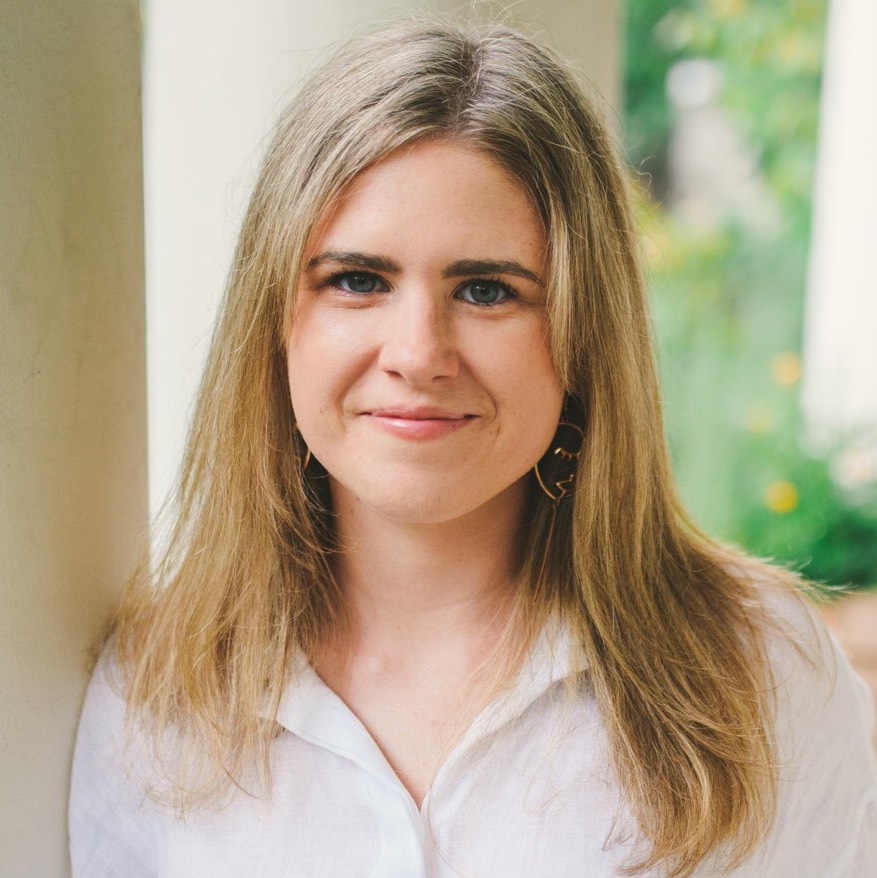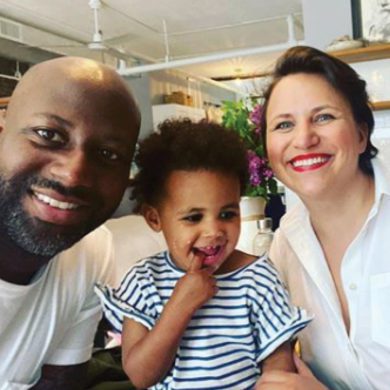Erin Folland was just four weeks pregnant when the vomiting started.
At first, she followed the advice that all pregnant women are given: adding ginger to everything, getting enough rest. But when her vomiting became so severe that she couldn’t keep a glass of water down, she knew it was time to head to hospital.
There, Folland, then 30, was diagnosed with hyperemesis gravidarum (HG), or severe morning sickness, and put on an IV drip to replenish her fluids. For a few blissful days, she was able to eat. But as soon as she was discharged, the vomiting started again.
“Even though I was given some medication which was supposed to stop my nausea and vomiting, the doctor wasn’t really knowledgeable or encouraging about the sickness,” Folland says. “I was told it could last for the first trimester, or even the whole pregnancy – nobody really knew.”
I was told it could last for the first trimester, or even the whole pregnancy — nobody really knew.
For the next six weeks, she vomited several times an hour. Unable to eat, drink or – some days, even move from her bed – she lost weight, and was forced to take three weeks off from her job as a service advisor at a trucking company.
As the relentless vomiting continued, Folland became a familiar face at her local emergency department, and, increasingly, found herself battling not just nausea but black waves of despair. “It was one of the hardest things I have ever gone through; the toll it put on my mind and body was life-changing,” she says now.
At 10 weeks’ pregnant – and having long run out of paid sick leave – Folland felt she could no longer continue. She and her husband wrestled with the decision, but the prospect of another six months of vomiting made the choice clear: she terminated the pregnancy. “It was a very hard decision for us to make. I never thought I would have to choose between my health and having a child”.
Today, Folland, at 34, still has time to start a family, but must weigh up she and her husband’s desire to have a baby with the prospect of falling ill again. “I guess we will keep talking about it until we come to a definite decision”.
She is speaking about her experience because, after researching the condition in more detail, she realises that the care she received was inadequate. “I’ve found out it was possible to carry on, to be on IV fluids more consistently, to have better drugs,” she says. “I wish people knew that there was support out there; I feel that the doctor should have told me I wasn’t the only one, that there’s someone out there with a similar story, and that I didn’t have to suffer alone.”
I wish people knew that there was support out there…and that I didn’t have to suffer alone.
Folland’s experience is thankfully rare (just one to five per cent of pregnant women will suffer from HG, and, of those, it’s estimated that 10 per cent will terminate their pregnancy because of it).
However, morning sickness is extraordinarily common.
Around four in five women experience nausea or vomiting during pregnancy (NVP) – the equivalent of 240,000 Australian women every year. For many, it’s little more than an inconvenience; for others, it’s debilitating.

Depression, anxiety, low quality of life and lost productivity are just some of the consequences that have been linked to morning sickness. (Around 65 per cent of pregnant women with NVP report they are less productive at work because of nausea.)
Access to treatment
Yet despite both its ubiquity and the impact that morning sickness has on women’s lives, very little is known about its causes.
Even more frustratingly, women with NVP often struggle to be taken seriously or receive adequate medical care. Just last week an Australian study found that one in four pregnant women are denied access to medication for nausea and vomiting thanks to a lack of education among healthcare professionals.
This comes as little surprise to Jayashri Kulkarni, a Professor of Psychiatry at Alfred Health and Monash University, who has spent years researching the care of pregnant women and says there is still a pervasive belief that pregnant women must “grin and bear it”. Whatever ‘it’ may be.
“While in a pregnancy there are two people that are involved — the mother and the developing foetus — the balance of care tends to go to the fetus,” she says.
It’s a dismissive attitude that is arguably reflected in the term morning sickness itself, which can occur at any time of the day or night.
Lack of research
In fact, morning sickness – much like other conditions that affect women’s bodies, such as endometriosis and menopause – has historically been overlooked and under-analysed.
Up until the 1960s, doctors were taught that morning sickness, including HG, was a psychological condition, affecting women who vomited to get attention.
Today, it’s accepted that morning sickness is physiological, but the exact causes remain unclear. Hormonal changes, particularly the rise of human chorionic gonadotrophin (hCG), are likely to be a factor but it’s not clear why some women suffer more than others.
“There is unlikely to be one single cause,” says Luke Grzeszkowiak, Associate Professor at the College of Medicine and Public Health at Flinders University. “Quite simply, there has not been enough interest or funding to generate the evidence we need.”
Quite simply, there has not been enough interest or funding to generate the evidence we need.
Part of the problem, he notes, is that it’s impossible to conduct clinical trials on pregnant women for ethical reasons.
Treatment exists – but doctors won’t prescribe it
A lack of clinical research – along with the lingering shadow of the thalidomide scandal – also helps explain why so many doctors are reluctant to prescribe medication for morning sickness.
In Australia, women are usually encouraged to try acupressure wrist bands and ginger, before being offered treatments like Vitamin B6, doxycycline, maxolon and, as a last resort, the prescription-only ondansetron.
However, a recent study of 249 Australian pregnant women by Professor Grzeszkowiak found that one in four struggled to access medication for nausea and vomiting. This was largely due to misleading labels and a lack of awareness about clinical guidelines from health care professionals.
Often, women were denied access to doxylamine, a powerful antihistamine, which is more commonly marketed in Australia as a sleep aid called Restavit.
Doxylamine is widely researched in conjunction with Vitamin B6 and approved for use among pregnant women in many countries around the world, including the US. (In 2015, Kim Kardashian famously took to Instagram to tell her millions of followers that the drug had successfully alleviated her nausea and vomiting during pregnancy.)
But here in Australia, doxylamine remains unrecognised by the Australian Therapeutic Goods Administration (TGA).
“To be approved for the treatment of nausea and vomiting in pregnancy or HG, an application needs to be made to the TGA,” Professor Grzeszkowiak explains, “and this costs a lot of time and money… With Australia being a relatively small country and doxylamine being a cheap medication, there is a relatively limited incentive for anyone to seek changes to its licensing status.”
This leaves Australian women in a quandary: while doxylamine is available over the counter without a prescription as a sleep aid, many women have found it difficult to obtain the medication from reluctant pharmacists.
To make matters even more confusing, in Australia, Restavit packets are emblazoned with an ominous health warning: ‘Do not use if you are pregnant”.
For first-time mother Sarah Cervin, who suffered severe morning sickness in the early weeks of her pregnancy with her son, the health warning on the Restavit packet was just one more cause for anxiety.
“I felt like I was doing the wrong thing. I was really confused about why I had been given the advice from my obstetrician [to take Restavit]. It sent me spiralling into a Google frenzy. It really added to my anxiety.”
Cervin, who had vomited five times a day until she started taking Restavit, experienced near-total relief from her symptoms once she started taking the medication. “The messaging really needs to be changed and made less scary.”
It sent me spiralling into a Google frenzy. It really added to my anxiety.
Long-time obstetrician, gynaecologist and clinical director at Mercy Health, Dr Bernadatte White, says that for many women “eating more frequently, eating before you get out of bed, familiarising yourself with what foods work for you and which don’t is the first step, and it works”.
However, she agrees that for others, pharmacy-grade drugs are both necessary and that “they will change the lives of some women”.
Dr White says that, for various reasons, there is a high level of complexity attached to pregnancy care that is not present in other conditions.
“Women’s health has certain overtones related to women’s rights, gender norm expectations and power struggles that do not apply to health in general,” she says. “Much of this also colours pregnancy care”.
Doctors and health professionals are also not immune to colouring their pregnancy health advice with their own experiences.
“Practitioners, midwives, doctors etc all bring their own experience and personality into their advice. For example, if you’ve had a baby yourself and suffered from bad nausea, you will be more comfortable in saying, ‘Let’s give that a shot’, compared to someone who will never be pregnant.”
Caitlin Kay-Smith, the founder of Hyperemesis Australia, believes it’s time that society’s approach to illness during pregnancy changed. She says she started her first pregnancy in 2018 “assuming that I would be able to trust in and rely on the health care professionals I chose to provide my care.”
Ultimately, she says, “that was not my experience”.
At five weeks’ pregnant, Kay-Smith was hit with constant and debilitating nausea, and by the sixth week, she was vomiting 10 times a day. At nine weeks, she finally went to hospital to get badly needed treatment.
“While I did come across some really knowledgeable and empathetic midwives, nurses and doctors, mostly I was met with disbelief, resistance and, often, flat out refusal to treat my symptoms. It was upsetting and infuriating that I couldn’t get the care I needed and that the reality of my suffering was being doubted.”
Mostly I was met with disbelief, resistance and, often, flat out refusal to treat my symptoms.
She is determined to see women taken seriously when it comes to morning sickness, and believes that doctors, family members and society in general stop dismissing their suffering as ‘normal’.
“We are not incubators. We can’t talk about the postnatal mental health epidemic without talking about what comes before the baby even arrives. Perinatal anxiety and depression are on the rise because of mistreatment.”
Professor Grzeszkowiak believes there needs to be more research into NVP and better communication about existing studies with new mothers. “While various local, national, and international guidelines exist, there have really been no efforts in disseminating those guidelines to the wider population, both from a health care professional and consumer perspective”.
Meanwhile, Folland hopes that more women will be given enough information to manage severe morning sickness, and is determined to do her part to help other women. “Anything to bring awareness to the issue so no one has to go through what I did. Also, so women know that they are not alone and there is help out there and people to talk to.”
If you are struggling with mental health issues in pregnancy, please contact Perinatal Anxiety and Depression Australia (PANDA)
Want more smart stories and stylish reads? Sign up to PRIMER’s weekly newsletter.













No Comments